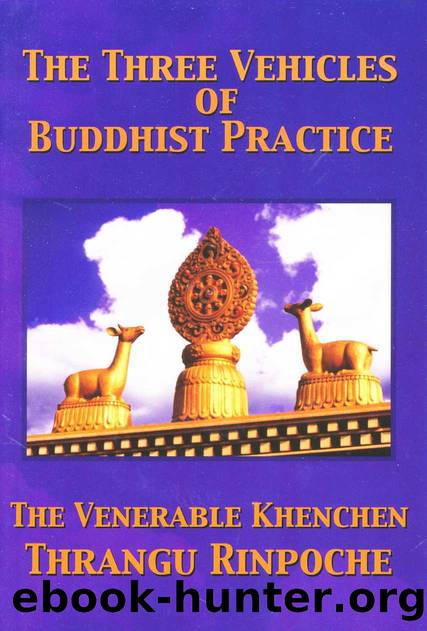The Three Vehicles of Buddhist Practice by Rinpoche Thrangu

Author:Rinpoche, Thrangu [Rinpoche, Thrangu]
Language: eng
Format: epub
Publisher: Namo Buddha Publications
Published: 2017-04-15T16:00:00+00:00
The Six Paramitas
The practice of the Mahayana of the bodhisattva is mainly concerned with the six perfections or paramitas . There are in fact ten15 paramitas but six of these are most commonly spoken of. So we will discuss the six paramitas, which constitute the bodhisattvaâs practice.
The Buddha said that when we do dharma practice, it should be done in a genuine and heartfelt way. This means that when we practice dharma, we must not just do it as an outer show or pretense or like a theatrical performance where actors dress up as kings and ministers even though they are not really kings and ministers. We must practice dharma wholeheartedly and very properly with our body, speech, and mind. When we perform virtuous actions with our body, our mind should also be there working for dharma. When we say things, our mind should mean it as well. Practicing the dharma wholeheartedly is very important. When we do a prostration, for instance, to make that prostration meaningful our mind should be filled with faith, devotion, and confidence. If we just prostrate with the body and the mind is not involved with it, then it is more like theater with us just going through the movements; the power is not there. It is the same when we recite mantras . If we recite a mantra while at the same time our mind is visualizing, we are filled with certainty, confidence, and faith; then all the power of the mind will be there, and it will be a very good practice. But if we recite mantras while our mind is elsewhere, then it is just a show, and the power is not there. It is not necessarily a bad thing to do a prostration or a mantra merely mouthing the words, just as it is not necessarily a bad thing that people pretend to be king and ministers in the theater. It only means the power is not there. So, if we really want to get everything possible out of practice, we need to do it very sincerely and wholeheartedly with our body, speech, and mind.
With this wholehearted approach the bodhisattvaâs practice is the practice of the six paramitas. The first is generosity, which means giving. There is giving to those who are worse off than us such as the poor, needy, and hungry. Then there is giving to those who are better off than us which means offering them the three jewels. These are the two main areas of generosity of the bodhisattva. When giving to those who are worse off, what is important is compassion, and when giving to those who are better off, what is important is faith, devotion, and confidence. So when we give to the poor, it relieves their poverty and hunger temporarily because of our compassion. When we make offerings to the three jewels, we make an expression of devotion. If we never give to those worse off, then compassion isnât there and it is not complete.
Download
This site does not store any files on its server. We only index and link to content provided by other sites. Please contact the content providers to delete copyright contents if any and email us, we'll remove relevant links or contents immediately.
The Way of Zen by Alan W. Watts(6600)
Ego Is the Enemy by Ryan Holiday(5412)
The Art of Happiness by The Dalai Lama(4125)
The Book of Joy by Dalai Lama(3972)
Why Buddhism is True by Robert Wright(3446)
Spark Joy by Marie Kondo(3298)
Shift into Freedom by Loch Kelly(3192)
Happiness by Matthieu Ricard(3040)
A Monk's Guide to a Clean House and Mind by Shoukei Matsumoto(2902)
The Lost Art of Good Conversation by Sakyong Mipham(2640)
The Meaning of the Library by unknow(2564)
The Unfettered Mind: Writings from a Zen Master to a Master Swordsman by Takuan Soho(2301)
The Third Eye by T. Lobsang Rampa(2257)
Anthology by T J(2206)
Red Shambhala by Andrei Znamenski(2192)
The Diamond Cutter by Geshe Michael Roach(2058)
Thoughts Without A Thinker: Psychotherapy from a Buddhist Perspective by Epstein Mark(2011)
Twilight of Idols and Anti-Christ by Friedrich Nietzsche(1888)
Advice Not Given by Mark Epstein(1878)
